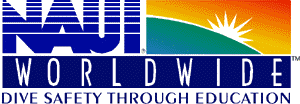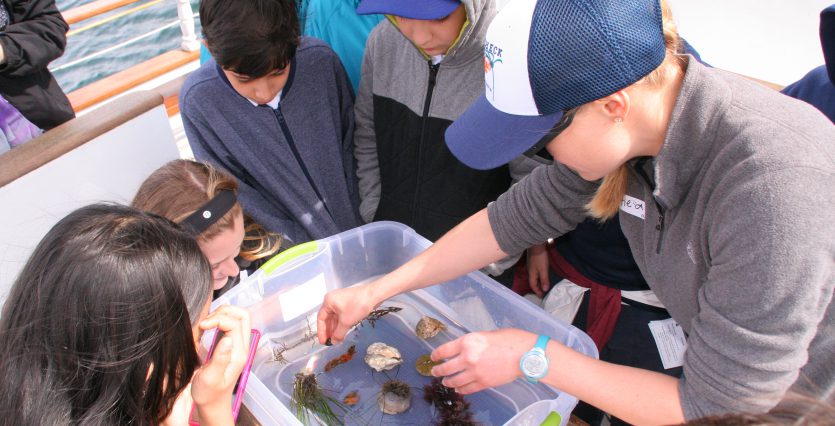Reef Check Foundation is an international organization working to protect tropical coral reefs and California rocky reefs through education, research, and conservation. Reef Check trains hundreds of volunteer divers to become citizen scientists who survey coral and rocky reefs every year. The data is used to improve the management and conservation of our marine habitats, and our citizen scientists become ocean ambassadors who lead their communities to care for their ocean resources.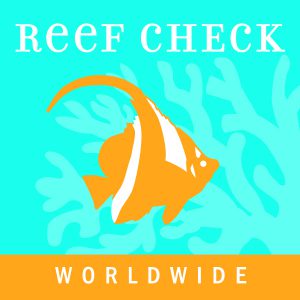
Ambitious Beginnings
The mid-1990s saw a global wave of concern for the health of coral reefs, as coral bleaching, unsustainable and destructive fishing and degrading water quality wreaked havoc on coral reefs across the world’s oceans. A group of concerned scientists created the first International Year of the Reef to develop solutions to the coral reef crisis. In this group was Dr. Gregor Hodgson, a marine ecologist from the United States, who had the idea to create a program that would engage the wider diving community into the cause of coral reef protection. Hodgson created a simple survey method to assess the health of coral reefs worldwide, easy to learn by the average diver and yet robust enough to yield data that could be used by scientists and resource managers to understand the state of the reef and develop practices to improve reef health. Hodgson called his protocol Reef Check, and in 1997, coordinated the first-ever global survey of coral reef health. The results of the work, published in 1999, shocked many in the scientific community who did not realize the extent of human impacts on reefs.
Thus was born Reef Check, a nonprofit organization that harnesses citizen science to foster ecosystem-based management of coral and rocky reefs around the globe by involving local communities in the protection of their resources. Reef Check maintains a global network of volunteer EcoDivers who regularly monitor and report on reef health, using a standard method that allows for comparison across the world’s oceans. These EcoDivers then become ocean ambassadors who educate their communities and the wider public about the value of these most diverse marine ecosystems on the planet. By linking community volunteers with scientists, resource managers, and decision-makers, Reef Check aims to catalyze and implement ecologically sound and economically sustainable solutions that will yield healthy reefs, and thus more resilient, thriving coastal communities that depend on them. To learn more about becoming a Reef Check EcoDiver or joining a Reef Check EcoExpedition, click here.
The Global EcoDiver Network
More than 20 years later, Reef Check teams have monitored coral reefs in more than 80 countries and territories around the globe, amassing one of the most extensive and longest-running datasets on reef health that exists on the planet, always freely available to anyone (data.reefcheck.us/).
In many places, Reef Check teams partner with government agencies and provide services and resources to the people who depend on the reef for their livelihood and well-being. For example, in Grenada, Reef Check teams taught the people of Carricou to create a fishery for the invasive lionfish, turning a social taboo into a source of food and livelihoods. In Malaysia, Reef Check works closely with the department of marine parks, providing annual monitoring data to inform management, training local islanders as marine park rangers and engaging coastal communities in the co-management of their coral reefs. In the Dominican Republic, Reef Check was designated by the government as the official management body for La Caleta Marine Protected Area, a place where Reef Check teams have been working with fishermen and community members for more than 10 years. In Haiti, Reef Check survey data from over 1,000 kilometers (620 miles) of coral reefs was used to help create two sets of Marine Protected Areas, and Reef Check teams trained many Haitians to swim and to gain access to their beautiful marine backyard.
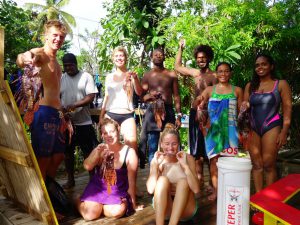
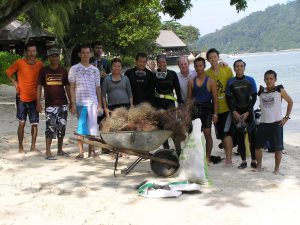
From Coral Reefs to Kelp Forests
California’s kelp forest ecosystems are home to some of the most diverse and productive kelp forest ecosystems in the world. Unfortunately, the health of this expansive ecosystem was being jeopardized by overfishing, pollution, sedimentation and climate change. In response to these threats, the California Legislature passed the Marine Life Protection Act (MLPA) in 1999 and mandated the state to design and manage a network of marine protected areas (MPAs) that would protect marine life, habitats, ecosystems, and natural heritage. The MLPA would require continuous monitoring of coastal habitats throughout the California coast. It was uncertain whether there would be enough trained divers to cover the thousands of miles of seafloor across California’s coastline to monitor these new MPAs.
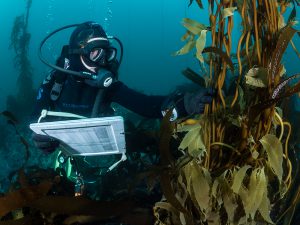
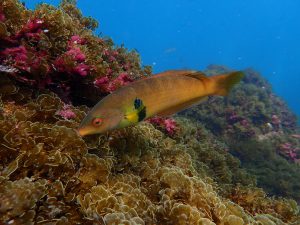
However, California is also home to perhaps one of the most dedicated, innovative and engaged scuba diving communities in the world. Craig Shuman, at the time a student of Dr. Hodgson, saw an opportunity, and in 2005, they developed the idea of a temperate reef kelp forest Reef Check. Applying Reef Check’s established approach of educating volunteer divers as citizen scientists, Reef Check could become instrumental in monitoring the huge expanse of kelp forest ecosystems across the state. Thus, Reef Check California was born.
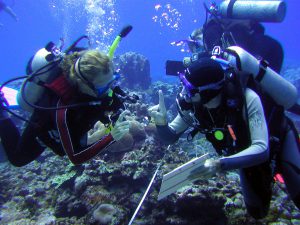
In 2006, Reef Check California partnered with NAUI to offer volunteer training in the form of a NAUI EcoDiver Specialty Course, which includes components in scientific diving, marine ecology and oceanography, fisheries management, and identification of ecologically and economically important species found in California’s rocky reef ecosystems. Divers who attend the four-day training can then become certified to collect data on each of four different transects (invertebrates, kelp, fish and habitat structure) to track changes of the kelp forest ecosystem. All volunteer divers are subsequently recertified every year during a mandatory one-day training to ensure data quality. To learn more about how you can become a Reef Check California certified diver, click here.

Reef Check California has collaborated with state agencies, the Ocean Science Trust, the Ocean Protection Council, the Partnership for Interdisciplinary Sciences of Coastal Oceans (PISCO) and other monitoring programs to establish ecological baselines for the marine environment inside and outside of California’s new marine protected areas network — a baseline that gives marine resource managers a starting point to determine whether protection efforts are working. This statewide MPA baseline monitoring has been expanded into a long-term monitoring effort, and as of this year, Reef Check California annually involves over 250 divers in its training and monitoring efforts, as well as surveys at over 100 sites along the coast, for many of which more than 10 years of data have been collected.
Monitoring Climate Change
Perhaps there is no greater challenge to future generations than climate change. It impacts lives across our planet, from devastating hurricanes to deadly wildfires, to reef ecosystems laid waste by warming waters. Now more than ever, close watch over our extraordinary and unique habitats is necessary to record changes and understand how to best protect these reefs. As these threats evolve, Reef Check is expanding its citizen science work worldwide and is now tracking invasive species, monitoring efforts to restore reef habitats where they have been decimated and, most importantly, has begun studying the effects of climate change on the ocean.
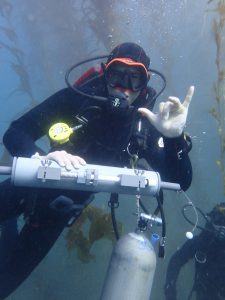 As ocean habitats are threatened by climate change, so are the livelihoods and well-being of millions of people in coastal communities. Soaked in the chemical makeup of the sea, marine organisms and ecosystems can be severely altered by climate-driven changes, intensifying the urgency for understanding these changes. Throughout the tropics, Reef Check is partnering with the U.S. National Oceanographic and Atmospheric Administration (NOAA) to use a new underwater temperature sensor that will make it possible for communities to understand how warming waters are impacting their coral reefs. Through this collaboration, called the Opuhala Project, NOAA will share these sensors with Reef Check teams all over the world, and hundreds of these sensors will be installed. The hope is that while these allow NOAA scientists to understand global patterns of ocean warming and changing currents, at the same time, they will help local communities to understand where to protect and save corals for future generations and become better keepers of their coral reefs in a changing climate.
As ocean habitats are threatened by climate change, so are the livelihoods and well-being of millions of people in coastal communities. Soaked in the chemical makeup of the sea, marine organisms and ecosystems can be severely altered by climate-driven changes, intensifying the urgency for understanding these changes. Throughout the tropics, Reef Check is partnering with the U.S. National Oceanographic and Atmospheric Administration (NOAA) to use a new underwater temperature sensor that will make it possible for communities to understand how warming waters are impacting their coral reefs. Through this collaboration, called the Opuhala Project, NOAA will share these sensors with Reef Check teams all over the world, and hundreds of these sensors will be installed. The hope is that while these allow NOAA scientists to understand global patterns of ocean warming and changing currents, at the same time, they will help local communities to understand where to protect and save corals for future generations and become better keepers of their coral reefs in a changing climate.
In California, Reef Check is working with scientists from the University of California, Santa Cruz and the Monterey Bay Aquarium Research Institute to implement a network of more than 60 temperature sensors and six multifunctional arrays along the entire coast. These sensors measure oxygen levels and ocean acidification and provide long-term ocean chemistry information. Combined with our long-term MPA monitoring data, this new information will allow us to begin to understand if and how the MPA network can protect California’s iconic kelp forest habitat against climate impacts.
Beyond studying the effect of climate change, Educational Marine Biological Adventures with Reef Check, or EMBARC, is training a future generation of ocean ambassadors and teaching them about the effects of climate change to the marine environment. Through the EMBARC program, schoolchildren receive the opportunity to board a whale-watching boat for a three-hour voyage, which is for many their first outing to the open ocean. During their journey, these students learn how to make environmentally conscious changes in their own lives and inspire others in their families and communities to do the same. For more information about the EMBARC program and how to become involved, click here.
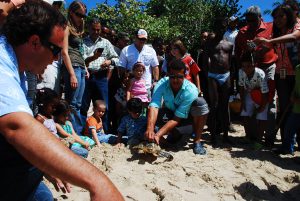
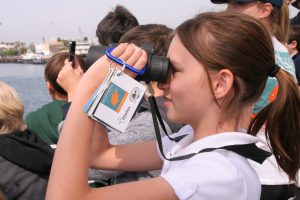
Diving with Purpose
Reef Check Foundation has accomplished so much since its beginning 20 years ago. The program has now amassed one of the longest-running, most geographically expansive scientific databases on the health of coral reefs. It has helped establish more than 20 marine protected areas, forged strong bonds between communities, scientists and managers and demonstrated how community-based management of marine resources is possible around the world.
The Reef Check California program has trained and certified over 1,700 volunteer divers as citizen scientists through its NAUI Reef Check EcoDiver certification. These citizen scientists have collected over 10 years of data during almost 1,000 surveys conducted inside and outside of California’s Marine Protected Areas. Reef Check training continues to empower people from all walks of life to understand their marine environments and to help protect them — one community at a time.
Become the Future of Reef Check
Reef Check welcomes all marine enthusiasts seeking to dive with a purpose. By joining Reef Check as either a volunteer diver or a Reef Check member, you can help continue our mission. As a Reef Check member, you can keep up with all the latest Reef Check news in our e-newsletter, The Transect Line. You will also receive invitations to participate in training, special events, our annual online auction and other exciting Reef Check activities! Find out more at reefcheck.org.
